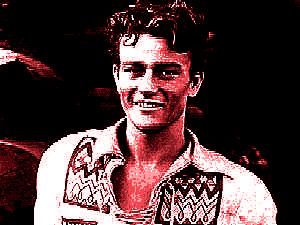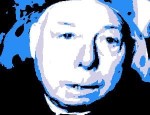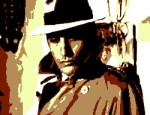Film Review
There is a sense of preordination in the fact that the first great
western of the sound era was the film in which John Wayne had his first
credited screen role. Think of the word
western and the likelihood is
that the first name that pops into your head is John Wayne.
(Apologies to Clint Eastwood fans.) The actor had appeared
in a dozen or so films prior to this, in fleeting bit parts, but this
is where his career began proper. And it so very nearly
didn't happen...
Director Raoul Walsh had considered casting himself in the leading role
in
The Big Trail and would
probably have done so had he not been involved in a car accident that
robbed him of his right eye shortly before the film went into
production. Walsh then considered an established star such as
Gary Cooper for the part, but, having lost a considerable amount of
money in the stock market crash, Fox set a budget which made it
impossible for Walsh to have both a big name actor and an extensive
location shoot. Walsh was not prepared to give up the location
shoot, so he was left with hiring an unknown actor for his lead
role.
It was John Ford who recommended to Walsh a bit player named Marion
Michael Morrison, mainly on account of his cocky walk, which suggested
he owned the world. Now Marion Morrison, was not the kind of name
that you would naturally associate with a butch cowboy hero and so Fox
executives and Raoul Walsh came up with a more suitable moniker.
Christened John Wayne, the completely unknown 23-year-old actor was
about to become a movie legend, although his initial salary was just
$105 a week, a thirty dollar rise on what he had been earning as a bit
player and stage hand.
There had been several westerns in the silent era (include John Ford's
epic
The Iron Horse) but the
genre fell into disrepute in the 1930s.
The Big Trail was one of the few
westerns made in this decade which took their subject seriously and
went beyond the tired old clichés. This was to be a lavish
production, providing a template for the high quality, big budget
westerns that would be made in the 1940s and subsequent decades.
Its stunning location vistas and ambitious action scenes (which include
one of the most impressive Indian attack sequences to grace a motion
picture) would inspire other filmmakers, in particular John Ford.
It is not a great exaggeration to say that, with this groundbreaking
film, Raoul Walsh pretty well invented the western movie as we
understand it today.
Unlike many subsequent big budget westerns,
The Big Trail puts a great deal of
emphasis on character, and this adds greatly to its authenticity and
entertainment value (although it does slow things down somewhat in a few places).
Tyrone Power Sr. (father of the legendary Hollywood actor) makes an absurdly
comical villain but it is hard not to warm to his larger-than-life
performance. El Brendel, as the comical Swede, nearly steals the
show with Louise Carver playing his bullying mother-in-law, making a
double act that was clearly a great loss to vaudeville. Tully
Marshall gives the most convincing performance and certainly helps to
make John Wayne look less wooden than he might have done if left to his
own devices.
And if you have ever wondered just
why
John Wayne talks the way he does (i.e. like a man trying to make
himself understood to a comatose Martian), this is because his
paymasters at Fox were initially so concerned about his diction that
they decided to subject him to an intensive course of speech
therapy. The man hired to do the job, Lumsden Hare, was
instructed to make John Wayne speak like an Englishman. An
Englishman trying to communicate with someone on the other side of a busy
airport concourse who is half deaf, half asleep and cannot understand
English, presumably.
Although
The Big Trail was
made on a colossal two million dollar budget, Fox believed that it
could recoup the cost by shooting the film in
Grandeur, a revolutionary
widescreen colour process using 70 mm film, as well as in the standard
black-and-white format on 33 mm. Fox was gambling that
audiences would be so wowed by the new format that the studio would
be in the vanguard of the biggest cinematic upheaval since the introduction
of sound three years earlier. Alas, the Great Depression
soon put paid to these ambitions.
Few cinemas could afford the cost of the
equipment need to project
The Big Trail in its Grandeur format, and the film
ended up being an enormous flop. Although Grandeur was soon
abandoned it was to provide the basis for the widescreen processes
(including VistaVision and CinemaScope) that became widely used from
the 1950s.
John Wayne was the biggest casualty of the film's failure. If the
film had succeeded, he would undoubtedly have become a star; instead,
he went back into virtual oblivion. He ended up making low budget
films for the so-called poverty row studios for most of the rest of the
decade. It was not until John Ford offered him the lead in his
1939 film
Stagecoach that John Wayne
returned to the mainstream and achieved his hard-won stardom.
After that, his name would become virtually synonymous with the quality
Hollywood western, Whilst the critics were rarely kind to
him, John Wayne was one of the most popular screen actors of
his generation and would leave an indelible impression on American
cinema. Even if he often does sound like like a man trying to
have a conversation with a comatose Martian.
© James Travers 2010
The above content is owned by frenchfilms.org and must not be copied.
Next Raoul Walsh film:
The Yellow Ticket (1931)



